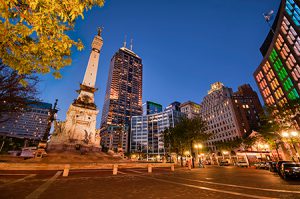
Indy Chamber picks Citizens’ Harrison to chair board
“The Indy Chamber is where business and community come together to move central Indiana forward,” Harrison said in a statement.

“The Indy Chamber is where business and community come together to move central Indiana forward,” Harrison said in a statement.

Greg Stowers is moving from his job as the City-County Council’s chief administrative officer and policy director to a new position with the Indy Chamber. In a question-and-answer session with IBJ, he discusses his new role.

Central Indiana Corporate Partnership, Indy Chamber and the Indianapolis Urban League are partners in Business Equity for Indy, which launched in 2020 with 11 member companies. Today it has 50.

Heading into a packed legislative session at the Indiana Statehouse, the Indy Chamber plans to focus its lobbying efforts on quality-of-place and human resources issues.

The regional development arm of the Indy Chamber will expand its coverage area after an agreement with the Greater Columbus Economic Development Corp., the organizations announced Friday.

Under the plan, former Indiana Secretary of Commerce Jim Schellinger will lead a new organization that operates more like the Indiana Economic Development Corp.

The taxing district is expected to generate about $4.65 million a year for downtown-focused efforts in Indianapolis, along with funding the operating costs of the low-barrier homeless shelter planned on the southeast side of downtown.

The university presidents agreed that retaining students in Indiana requires a collaborative effort by universities and employers to channel students into enticing and promising jobs.

The Indy Chamber on Tuesday announced several changes to its leadership ranks, including a new chief financial officer and vice president of government affairs.

As an alternative, the House approved a separate measure that would allow the City-County Council to increase the countywide local income tax by .02% to help pay for the operating costs of a homeless shelter and various improvements in the city’s Mile Square.

The coalition’s efforts build on 2023 legislation that was designed to jumpstart a statewide modern youth apprenticeship model in Indiana.

The majority of people who testified about the bill were against it, arguing that it would undo the work of corporate and civic leaders to boost perceptions of downtown in the aftermath of the pandemic and the 2020 protests for racial justice.

New legislation would repeal language included in the 2023 state budget that gave the city of Indianapolis the authority to create a special Mile Square taxing district to pay for downtown enhancements and a low-barrier homeless shelter.

Leaders in the Republican-dominated Indiana Legislature say they’re not planning on taking on gambling expansions, water fights or costly initiatives during the shorter non-budget session, which begins in January and must end by mid-March.

The trip comes as Indiana plans to roll out a new program allowing eligible high school students to receive up to $5,000 in state funding for “career scholarship accounts” that can be used to “shop” for work-based learning experiences.

As they embark on a new vision for the interstates that run through Indianapolis, state transportation officials say they hope to learn from past mistakes by making community engagement a focal point of the planning process.

Under the proposal, the revenue could only be used in the Mile Square for services that are now provided by the not-for-profit Downtown Indy Inc., such as cleanliness initiatives, homelessness outreach and providing “safety ambassadors.”

The business advocacy group questioned how the effort would improve academic performance and why students in the district’s Innovation charter schools wouldn’t receive an equal portion of the funding.

Indiana University said Michael Huber—who previous served as former Mayor Greg Ballard’s deputy mayor for economic development—will lead government relations efforts at the state and federal level as well as economic engagement.

Ian Nicolini, who has served as Indy Chamber’s chief operating officer since October 2020, is leaving his position to join a commercial real estate developer working to recruit businesses to a high-tech research district planned in Boone County.